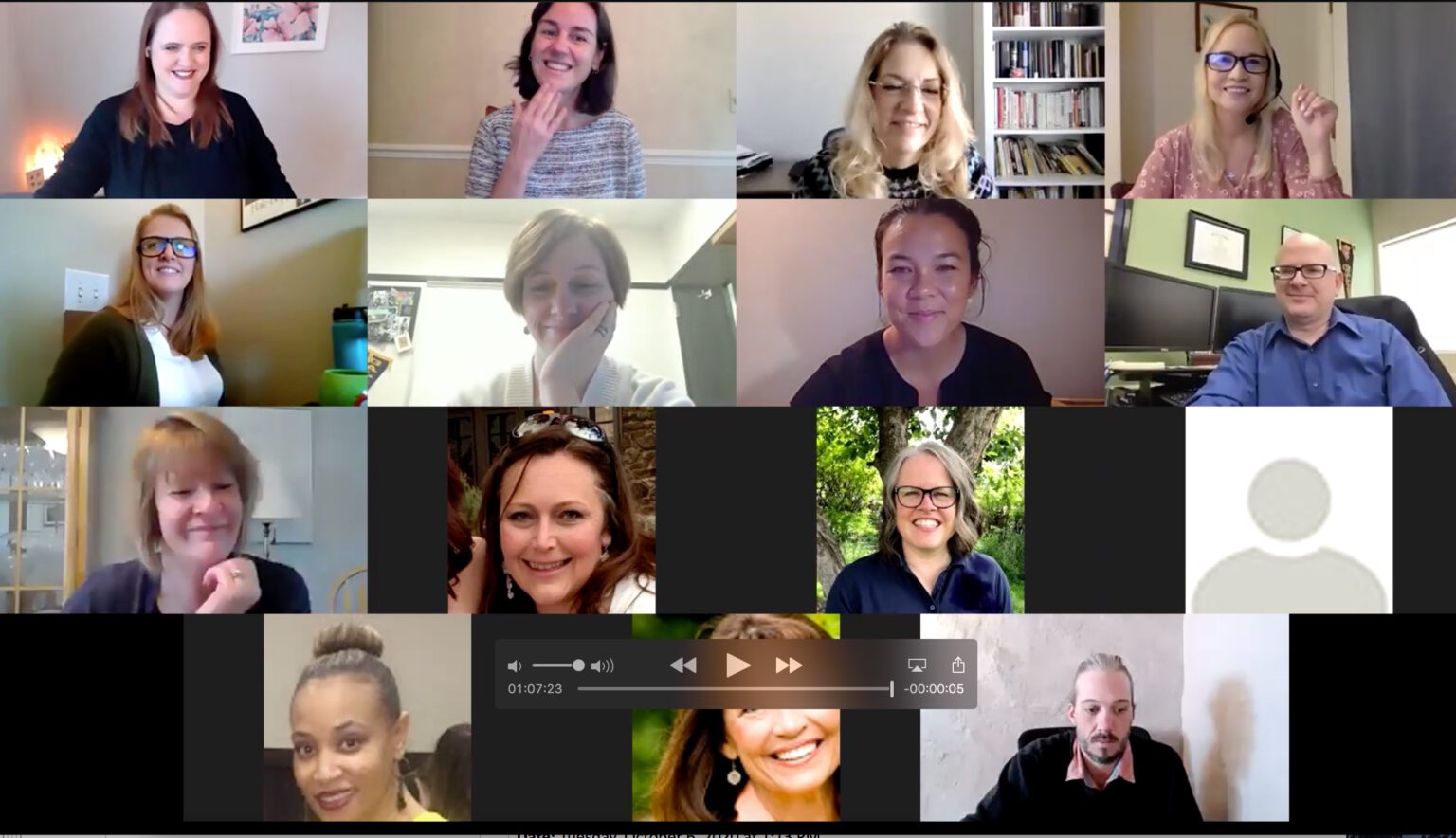Leaders in education and vocational rehabilitation (VR) met throughout the summer and fall in Engage for Change | state (EFC) online regional meetings organized by the National Deaf Center on Postsecondary Outcomes (NDC) — determined to advance their short-term pandemic response and proactively create long-term strategies to improve services, support, and outreach to deaf youth.
The power of regional partnership was on full display. Because of EFC networks the leaders have built over the past three years, they could tap that trust and familiarity in regional meetings to foster cross-state collaboration, share effective practices, and broaden their focus to consider making lasting changes and service improvements that can endure post-pandemic.
As one state leader put it: “We finally feel like we’re not drowning and can now reset, [to] engage in a thoughtful way.”
Common Challenges and Emerging Successes
Common themes that emerged at their national meeting in May continue to shape state leaders’ most critical concerns at their eight regional meetings. The regions are:
Midwest: Leaders from Illinois, Indiana, Iowa, Kansas, Michigan, Minnesota, Missouri, Nebraska, North Dakota, Ohio, Oklahoma, and Wisconsin met June 25 and October 1.
Northeast and Mid-Atlantic: Leaders from Connecticut, Delaware, Maryland, Massachusetts, New Jersey, Pennsylvania, and Virginia met July 21 and October 13.
Southeast: Leaders from Alabama, Florida, Georgia, Kentucky, Mississippi, North Carolina, South Carolina, and Tennessee met July 30 and October 20.
West and Southwest: Leaders from Arizona, Colorado, Hawaii, Idaho, Montana, Nevada, New Mexico, Oregon, Texas, Utah, Washington, and Wyoming met August 25 and October 27.
Challenge: Technology and Online Access
Every state is facing some technology issue due to the rapid shift to online work and engagement, including unstable or nonexistent internet connections for staff and clients. There is also the daunting task of moving almost everything online — in-person programs, service delivery, IEP processes, VR training, and events — in accessible and equitable ways.
Emerging successes to address technology included:
Pennsylvania is investigating the development of long-term technology platforms to serve clients for years to come, in particular rural clients.
When Virginia used Zoom for an online summer program, they proactively contacted families in advance of the event to make sure they had technology in place, then did dry runs with small groups of students and families.
The Mid-Atlantic group made plans to connect each other’s technology departments, to quickly facilitate and share best practices and protocol development.
Alabama purchased a license to pilot a virtual job shadowing platform to provide pre-employment transition services (Pre-ETS) online.
Challenge: Isolation and Mental Health Issues
In summer polls of VR professionals conducted by NDC, the biggest impact on deaf youth during the pandemic is isolation and mental health issues (44.5%), followed by uncertainty and inability to plan for the future (25%). This is echoed by state leaders, many of whom have reached out to the deaf community to take the lead in access during COVID-19.
Emerging successes are finding some bright spots on the state level, including:
South Carolina worked with deaf service agencies to make sure they knew mental health assistance is available.
Montana is using grants to mentor parents of deaf students. By pairing hearing families of deaf youth with deaf adults, they can learn about ASL, deaf culture, and how deaf people can succeed, which improves parental attitudes.
Nebraska collaborated with Hands & Voices to set up a deaf mentor program for families.
North Carolina got very positive feedback from parents about their teletherapy model.
Colorado recognizes the need and is taking action to support the mental health of both professionals and students.
Challenge: Communicating in a Pandemic
How can people effectively communicate online in offices and classrooms, through face masks, and with ASL? Emerging communication successes include:
Pennsylvania, Alabama, Montana, North Dakota and several other states sourced clear face masks.
In South Carolina, Clemson created an ASL tutoring center for one-on-one sessions via Zoom two days a week statewide.
Florida Vocational Rehabilitation is using CDIs and vendor interpreters in addition to staff interpreters to meet the in-person and remote access needs during the pandemic.
Idaho is working across agencies to create videos that will be used with students and VR counselors to better understand the VR process and services.
Indiana created a technical assistance tool to support navigating access in the workplace with masks and social distancing.
Challenge: Organizing Programs and Events Online
Shifting in-person events to online settings has been a challenge — and also an opportunity, because states can now engage students who have never been able to attend in-person events. However, some agencies don’t allow Zoom or other online gathering tools. Many state leaders cited NDC’s online VR expert panels as an important source of ideas and collaboration on this topic.
Emerging successes include:
Virginia held a 3-day online program for deaf students in July to address self-advocacy, job exploration, educational and training opportunities, workplace readiness with mock interviews, and stories from deaf role models (including NDC’s #DeafSuccess videos). Packets of handouts were sent to student homes in advance and activities were emailed every evening.
South Carolina is doing Transition Tuesdays on the last Tuesday of every month to focus on topics and role models, and it reorganized a summer camp into five online lunch-and-learn sessions instead. It is also partnering with Kentucky and Tennessee on a deafblind project that includes a transition focus.
Before the pandemic, Utah used grants and partnership to develop online courses that have positioned them well during COVID-19. They have also set up access standards for online meetings.
Washington successfully launched a three-day online event called “Deaf Ready” at the end of September with more than 25 businesses providing informational interviews and employee panels.
Hawaii School of the Deaf and Blind increased access to instruction when they went online, because students who couldn’t fly to the island before the pandemic could now attend virtually.
Colorado is seeking to partner with neighboring states to collaborate on webinars for transition age deaf youth.
Challenge: Finding and Connecting with Deaf Students
In particular, those students without active VR cases can be hard to find, especially in states where referrals are declining. Several states cited “lost” students, who appear to have dropped out of online classes, although others note IEP attendance has been “strong.” States have found success in unique ways:
Tennessee is focused on building young leaders in the deaf community, to help chart plans and connect with students in ways that older role models cannot.
Idaho hired its first deaf VR counselor.
Arizona’s focus is on collaboration to work with Pre-ETS outreach starting in the freshman year of high school, with the goal to have all students during grades 9-12 connect with VR programming and eventually start transition planning as young as 10 years old.
Washington state invites VR counselors to student IEP meetings starting at age 14.
Hawaii’s education interpreters used Instagram through a local high school to connect deaf students they had lost track of in the spring, providing tutoring, small group work, and tech support.
About EFC | state
Engage for Change | state brings leaders from state-level education and vocational rehabilitation agencies together to close gaps in education and employment for deaf people. Through networks of shared leadership and peer support, state leaders tap NDC’s support and resources to create an exchange of ideas and collaboration that would otherwise be impossible. Managed by State Engagement Coordinator Jen Higgins, Engage for Change | state is committed to systems change and promoting #DeafSuccess.









